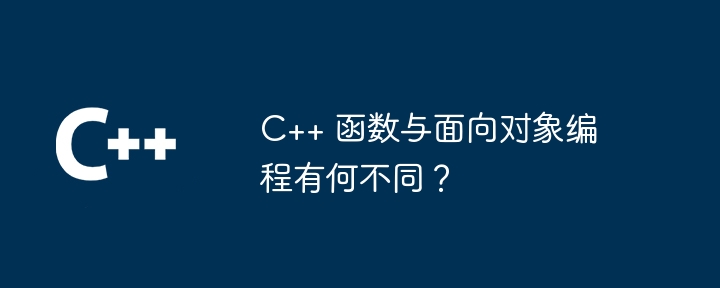How do C++ functions differ from object-oriented programming?
Apr 11, 2024 pm 09:12 PMFunctions and Object-Oriented Programming (OOP) provide different programming mechanisms in C: Functions: independent blocks of code focused on performing a specific task and containing no data. OOP: Based on objects, classes and inheritance, data and behavior are encapsulated in objects. In practical cases, the function method for calculating the area of ??a square is simple and direct, while the OOP method encapsulates data and behavior and is more suitable for managing object interaction. Choosing the appropriate approach depends on the scenario: Functions are good for independent tasks, OOP is good for managing complex object interactions.


Hot AI Tools

Undress AI Tool
Undress images for free

Undresser.AI Undress
AI-powered app for creating realistic nude photos

AI Clothes Remover
Online AI tool for removing clothes from photos.

Clothoff.io
AI clothes remover

Video Face Swap
Swap faces in any video effortlessly with our completely free AI face swap tool!

Hot Article

Hot Tools

Notepad++7.3.1
Easy-to-use and free code editor

SublimeText3 Chinese version
Chinese version, very easy to use

Zend Studio 13.0.1
Powerful PHP integrated development environment

Dreamweaver CS6
Visual web development tools

SublimeText3 Mac version
God-level code editing software (SublimeText3)
 C function example
Jul 27, 2025 am 01:21 AM
C function example
Jul 27, 2025 am 01:21 AM
Functions are the basic unit of organizing code in C, used to realize code reuse and modularization; 1. Functions are created through declarations and definitions, such as intadd(inta,intb) returns the sum of the two numbers; 2. Pass parameters when calling the function, and return the result of the corresponding type after the function is executed; 3. The function without return value uses void as the return type, such as voidgreet(stringname) for outputting greeting information; 4. Using functions can improve code readability, avoid duplication and facilitate maintenance, which is the basic concept of C programming.
 C decltype example
Jul 27, 2025 am 01:32 AM
C decltype example
Jul 27, 2025 am 01:32 AM
decltype is a keyword used by C 11 to deduce expression types at compile time. The derivation results are accurate and do not perform type conversion. 1. decltype(expression) only analyzes types and does not calculate expressions; 2. Deduce the variable name decltype(x) as a declaration type, while decltype((x)) is deduced as x due to lvalue expression; 3. It is often used in templates to deduce the return value through tail-set return type auto-> decltype(t u); 4. Complex type declarations can be simplified in combination with auto, such as decltype(vec.begin())it=vec.begin(); 5. Avoid hard-coded classes in templates
 C fold expressions example
Jul 28, 2025 am 02:37 AM
C fold expressions example
Jul 28, 2025 am 02:37 AM
C folderexpressions is a feature introduced by C 17 to simplify recursive operations in variadic parameter templates. 1. Left fold (args...) sum from left to right, such as sum(1,2,3,4,5) returns 15; 2. Logical and (args&&...) determine whether all parameters are true, and empty packets return true; 3. Use (std::cout
 C range-based for loop tutorial
Jul 27, 2025 am 12:49 AM
C range-based for loop tutorial
Jul 27, 2025 am 12:49 AM
C's range-basedfor loop improves code readability and reduces errors by simplifying syntax. Its basic structure is for(declaration:range), which is suitable for arrays and STL containers, such as traversing intarr[] or std::vectorvec. Using references (such as conststd::string&name) can avoid copy overhead and can modify element content. Notes include: 1. Do not modify the container structure in the loop; 2. Ensure that the range is effective and avoid the use of freed memory; 3. There is no built-in index and requires manual maintenance of the counter. Mastering these key points allows you to use this feature efficiently and safely.
 C binary search tree example
Jul 28, 2025 am 02:26 AM
C binary search tree example
Jul 28, 2025 am 02:26 AM
ABinarySearchTree(BST)isabinarytreewheretheleftsubtreecontainsonlynodeswithvalueslessthanthenode’svalue,therightsubtreecontainsonlynodeswithvaluesgreaterthanthenode’svalue,andbothsubtreesmustalsobeBSTs;1.TheC implementationincludesaTreeNodestructure
 C call python script from C example
Jul 26, 2025 am 07:00 AM
C call python script from C example
Jul 26, 2025 am 07:00 AM
Calling Python scripts in C requires implementation through PythonCAPI. First, initialize the interpreter, then import the module and call the function, and finally clean up the resources; the specific steps are: 1. Initialize the Python interpreter with Py_Initialize(); 2. Load the Python script module with PyImport_Import(); 3. Obtain the objective function through PyObject_GetAttrString(); 4. Use PyObject_CallObject() to pass parameters to call the function; 5. Call Py_DECREF() and Py_Finalize() to release the resource and close the interpreter; in the example, hello is successfully called
 C reference example
Jul 28, 2025 am 02:23 AM
C reference example
Jul 28, 2025 am 02:23 AM
References are alias for variables, which must be initialized at declaration and cannot be rebinded. 1. References share the same memory address through alias. Modifying any name will affect the original value; 2. References can be used to achieve bidirectional transmission and avoid copy overhead; 3. References cannot be empty and have the grammar, and do not have the ability to repoint compared to pointers; 4. ConstT& can be used to safely pass parameters, prevent modification and support binding of temporary objects; 5. References of local variables should not be returned to avoid dangling reference errors. Mastering citations is the key foundation for understanding modern C.
 C fstream example
Jul 28, 2025 am 01:20 AM
C fstream example
Jul 28, 2025 am 01:20 AM
First, let’s clarify the answer: This article introduces the use of fstream in C, including basic file read and write operations and advanced bidirectional read and write functions. 1. Use std::fstream to define the file flow object, and open the file in a specified mode (such as std::ios::out, std::ios::in); use it when writing






